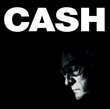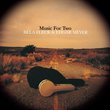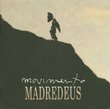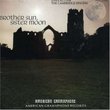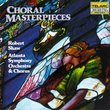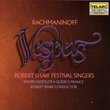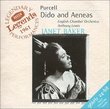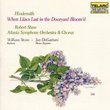| All Artists: Nathan Gunn, Samuel Barber, Bela Bartok, Ralph Vaughan Williams, Robert Shaw, Carmen Pelton, Richard Clement Title: Barber: Prayers of Kierkegaard/Bartok: Cantata profanna/Vaughan Williams: Dona nobis pacem Members Wishing: 1 Total Copies: 0 Label: Telarc Release Date: 3/24/1998 Genre: Classical Styles: Opera & Classical Vocal, Historical Periods, Modern, 20th, & 21st Century Number of Discs: 1 SwapaCD Credits: 1 UPC: 089408047923 |
Search - Nathan Gunn, Samuel Barber, Bela Bartok :: Barber: Prayers of Kierkegaard/Bartok: Cantata profanna/Vaughan Williams: Dona nobis pacem
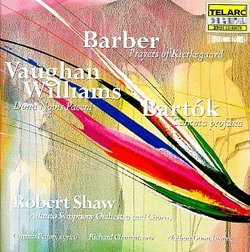 | Nathan Gunn, Samuel Barber, Bela Bartok Barber: Prayers of Kierkegaard/Bartok: Cantata profanna/Vaughan Williams: Dona nobis pacem Genre: Classical
It's unclear why this program works so well, but it does. It may be because all three composers resolutely affirmed the virtues of tonality at a time when it was terribly out of fashion, though each did it in his own way. ... more » |
Larger Image |
CD DetailsSynopsis
Amazon.com It's unclear why this program works so well, but it does. It may be because all three composers resolutely affirmed the virtues of tonality at a time when it was terribly out of fashion, though each did it in his own way. Barber was a genuine neo-Romantic before we had the term to describe him, so his heartfelt and emotional music was simply called "backward looking" while he was alive. Vaughan Williams and Bartók were both authorities on folk song who used the "uncouth vocal utterance of the people" to forge fresh and contemporary musical styles. Robert Shaw, one of the great choral music conductors of all time, plays all three works with a near ideal combination of clarity and intensity, and, of course, the chorus is sensational. --David Hurwitz Similarly Requested CDs
|
CD ReviewsWhy didn't Shaw record more Vaughan Williams? Samer T Ismail | Danbury, CT | 12/18/2000 (5 out of 5 stars) "In the final CD to be released before his death in 1999, Shaw finally got around to recording "Dona nobis pacem". The performance is essentially flawless, with soloists, chorus, and orchestra giving their all. Shaw brings out the emotions--both violent and tranquil--in a way unmatched by any other recording, except perhaps for Hickox. Were this the only work on the CD, it would still be worth full price.Thankfully, Shaw gives us not one but two more works to fill the CD--Bartók's "Cantata profana" and Barber's "Prayers of Kierkegaard". Both works, especially the latter, receive masterful performances; Shaw's recording is much more lyrical than the other available version (Schenck with the Chicago SO), especially in the soprano solo ("Lord Jesus Christ").All in all, this disk, which won three Grammys, is a must-have." Shaw's rendition of Dona Nobis Pacem a spine tingler James Osborn | Vineyard Haven, MA United States | 04/13/1999 (5 out of 5 stars) "I bought the CD because our local chorus was singing Vaughan Williams. The recording is spectacular. The recording is so clear that it's easy to pick out the four voices for practice. But especially given the current events in the Balkans, this piece gives a listener chills, for it clearly exposes the consequences of war while offering the hope for peace masterminded by the Almighty." Lesser-known Choral Masterpieces Brett A. Kniess | Madison, WI | 12/13/2005 (5 out of 5 stars) "A disk of lesser-known choral/orchestral works by great masters of composition are always a welcome addition, and this CD doesn't fail, perhaps giving these works new life and hopefully a new future of performances.
The Danish-born theologian Soren Kierkegaard and his prayers from various writings are the subject of Samuel Barber's Prayers of Kierkegaard. The prayers are very personal, having to do with redemption and God's love, a keen insight to existentialism, and Barber's music expresses it well. While a unified whole, the 15+ minute work is divided into four separate prayers, each a style and a setting different from one another. Barber lets the listener know this is religious music by setting the opening text in chanting men's voices in an old church mode. But when the orchestra comes in, a 20th century declamatory statement changes the mood. Barber again looks to the past with simple contrapuntal choral writings. The second prayer is a supplicatory soprano solo sung by Carmen Pelton. A 20th century chanting chorus, reminiscent of thick Russian orthodox music opens the third prayer. Barber again brings back contrapuntalism and a great dissonant melody eventually dividing into two choruses. The final prayer begins with a wild instrumental modal dance section, and the end brings back the simple chant-like feel of the beginning, and the final, modern chorale ending with a positive outlook. Scored for orchestra, soprano, alto, and tenor soloists, and chorus, Barber's unique, and often intimate compositional styles, shine through here. The motives used throughout are enjoyable, the music creates great drama, and the work is quite inspired. It is very much spiritual and artistically pleasing. Bartok's Cantata Profana is a different matter. It tells the story of nine sons who were taught nothing but to wander the forest and hunt stags. One day they wander too far into the enchanted part of the forest, only to be turned into stags themselves. Bartok sets this 20 minute work in three parts. The first showcases the double, sometimes antiphonal, chorus in thick imitation and dissonance. The chorus explains the back-story and relays the wandering in the forest, including a rather frenzied rhythmical jaunt. The second section is a feature for tenor and bass soloists, the tenor being the best-loved brother turned stag, and the bass being the father who went wandering looking for them. The father pleads with them, but as stags, they can't go home to their weeping mother. The short third section brings back themes and texts from the first and the second with tenor soloist exclamation. This music is interesting, not as folk-like as I expected, very modern sounding with dissonance leading the tonality. The soloists are required to sing some extreme ranges for the angst of the text and the chorus parts are difficult as well. The demonic chanting in the third section show the unusual harmonies and subject matter, not to mention musical virtuosity, of this very unusual, yet interesting choral work. Unfortunately, Walt Whitman's poems about war and Vaughan Williams' music of the same vein, will probably never have little meaning for the public. The six movement Dona Nobis Pacem is the most stirring work on this disk, with various perspectives of war; texts by Walt Whitman primarily, some biblical texts, and an impassioned British speech. The Agnus Dei states the suffering and sacrifice of Christ, but ends with grant us peace. Beat! Beat the Drums! is a bombastic march about how war affects all citizens, not just those who fight. Reconciliation is a lush and somewhat haunting song on the tides of war, in a personal perspective. The Dirge for Two Veterans is a procession which builds to a great climax and dies away; the text visualizing a community honoring the passing of two local veterans. The Angel of Death and O Man Greatly Beloved is a magnum opus of contrasting moods, which erupts into a paean of "Glory to God in the Highest, and peace and goodwill to man". Even today, well after WWII when the music was written, certainly well after Walt Whitman's Civil War era's words, these performances of Dona Nobis Pacem is so personal, not a dry eye leaves the concert hall. The disk presents a moving and electrifying performance. All the works on this disk, especially with the wide range of styles, is performed flawlessly. As always, Robert Shaw's choruses have clean and crisp diction, with good vocal technique. The Atlanta Symphony Orchestra gives these works a Romantic fullness needed, and the soloists are fine as well. While together, the program seems odd, the works in themselves deserve more popularity. A nice addition to the choral/orchestral library." |

 Track Listings (13) - Disc #1
Track Listings (13) - Disc #1
